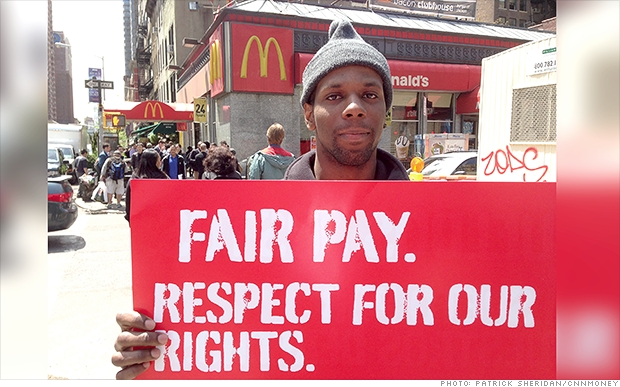By Mehroz Siraj
Many American fast food consumers would find it hard to buy their Big Macs and chicken nuggets across the United States on May 15as employees of the big fast food chains would be organizing a national strike demanding a doubling of the national minimum wage to US$15.
Organized under the banner of unions such as Fight For 15 and Fast Food Forward, workers working at fast food chains such as McDonald’s, Wendy’s, KFC and others would descend down onto the suburban Maccas across New York City.
They would be ably supported by other fellow workers who are reportedly organizing massive protests across 150 American cities.
These protests follow the publication of new research that suggests that although the costs (in US dollars) of purchasing a Maccas Big Mac burger are approximately the same around the world, fast food workers are generally worst off in America when compared to their counterparts in other developed countries.
The Economist magazine’s 2013 study into the cost of McDonald’s burgers internationally had sensationally revealed that the average cost differential between the Big Mac meals sold in Australia and the US was meaningless.
The study however questioned the fast food giant’s rationale behind paying its workers the minimum wages of $7.25 per hour in the US while it is simultaneously paying $16 or more per hour to its Australian workers.
Ongoing research and US media reporting have shown that real wages and hourly rates across the retail, fast food and hospitality sectors across the US have stagnated since the late 1970s.
In recent years, according to The Guardian, American wages have failed to keep up with the increasing cost of living and the changing family social structures around the country, however corporate profits are breaking one ceiling after another.
The British online publication reported that McDonald’s Corporations, which employs up to 1.8million people had seen a ballooning operating profit of $5.4billion in 2012, yet it resisted calls for raising the minimum wages of its American workers.
Stagnant minimum wages, along with the spiralling costs of living and the depreciating value of the American greenback have contributed heavily towards America’s economic free-fall since 2008, experts argue.
These realities have also ensured that many American workers would be unable to pay off their costs of living thus many of them are now protesting this week.
One such protestor this week would be twenty-six year old Frankie Tisdale, who works at a KFC eatery in Brooklyn.
Only earning US$8 an hour, he said that at times he had to prioritise between buying food for his family and doing his fortnightly laundry.
Earning less than $200 a week, Tisdale is one of the 900,000 Americans listed by the US Census Bureau as living below the poverty line because his annual income is less than the recommended $23,000.
In an interview that he gave to CNNMoney, he questioned the seriousness of Brooklyn’s law enforcement authorities to investigate cases of slave wages and payroll theft in which he alleged that many franchise owners were involved in.
“Everything costs more. Why cannot my pay go up?” questioned the father of two children.
These protests have been organized only weeks after the McDonald’s corporation settled lawsuits worth over US $500,000 with workers who claimed wage theft.
Acceding to the union demands, on Labor Day (May 1st in the US), Seattle’s mayor, Ed Murray unveiled a new plan that would see the city’s minimum wages rise to US$15 an hour, the highest in the country.
However, these protests also outline the massive gulf that exists between fast food workers in the US and their well-paid counterparts across Europe and Australia, where government intervention and oversight guarantees fair pay and good working conditions.
Nationally, Fair Work Australia (FWA) is legally allowed to randomly undertake payroll audits to detect wage thefts and other frauds happening within the nation’s food and hospitality industry.
Since its inception in 2009, the agency has investigated over 300 small and medium sized franchises for various frauds.
In Denmark, many fast food workers said that whilst they sympathised with their American counterparts, they had no reason to protest against the country’s fast food industry moguls.
Government legislation in that country guaranteed wages of up to US$21 an hour, said a McDonald’s worker, Louise Marie Rantzau.
“I was surprised when I heard workers in the U.S. had to fight so hard for just $15 and better rights,” she told Al-Jazeera.
“Fast-food companies need to treat the people who make and serve their food with the same respect everywhere,” she added.

